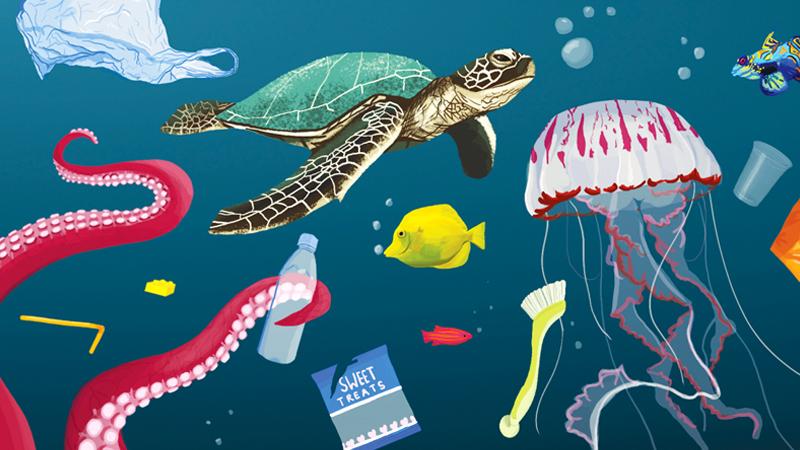
Plastic pollution has snowballed into a massive threat to ecosystems, including marine life, wildlife and human life. Some 300 million tons of plastic is generated annually. The issue has doubled over the past 50 years, spreading it from the Mariana Trench to the Mount Everest, ranging from the deepest point in the ocean to the highest peak of the world. Research has revealed that a person consumes around 70,000 microplastics every year and over 1.1 million seabirds and animals succumb to plastic pollution.
 Plastic pollution is basically caused by the accumulation of man-made waste in the environment. It can be defined as, ‘accumulation and permeation of man-made plastics into the environment bringing desolation to ecosystems and living beings’.
Plastic pollution is basically caused by the accumulation of man-made waste in the environment. It can be defined as, ‘accumulation and permeation of man-made plastics into the environment bringing desolation to ecosystems and living beings’.
The plastic waste crisis has called forth the United Nations to write and negotiate a global treaty. The UN also predicts that by 2050, more plastics than fish would be found in oceans.
Modern plastics
With the use of natural materials, such as rubber, collagen and galalith that have ingrained plastic properties, what we consider as modern plastics emerged as eventually the materials generated from fossil fuels were put through chemical modifications. True that plastics provide many conveniences to human life, yet discarding them in landfills and environment causing them to be dispersed in rivers, streams and oceans ultimately giving rise to floods has to be reckoned with in no time.
Offering an ultraefficient solution for the exponential pollution of plastics, ‘Solubag’, a Chilean company with three years of commitment and experiment pertaining to the innovation of packaging products and flexible packaging has invented and introduced an eco-friendly, biodegradable and soluble material for the creation of non-polluting bags generated from plastic-free materials. This material is capable of replacing the plastics around us completely.
This biodegradable plastic substitute is composed with patented technology using ‘polyvinyl alcohol’ (PVC) with a composition of natural gases and common minerals that makes the material dissolve in water within five minutes (non-plastic bags dissolve in cold water, non-woven fabric bags dissolve in hot water) and raw materials, including limestone.

After dissolving, it spares only the natural substances found in nature, such as harmless carbon with which water is even safe enough to drink.
It doesn’t contain oil derivatives which allows it to decompose over time. it is supposed to decompose within 180 days into common soil components.
 This material is reusable, firm, elastic, flexible, resistant, non-toxic and printable with non-toxic colours. ‘Solubag’ material aims at wiping out all the single-use plastic bags that are a massive ecological burden to the planet. This material doesn’t require any special machine to create bags, the eco-friendly bags can be generated in the same machinery that manufactures flexible plastic foils. The ‘Solubag’ materials are already FDA (food and drug administration ) approved.
This material is reusable, firm, elastic, flexible, resistant, non-toxic and printable with non-toxic colours. ‘Solubag’ material aims at wiping out all the single-use plastic bags that are a massive ecological burden to the planet. This material doesn’t require any special machine to create bags, the eco-friendly bags can be generated in the same machinery that manufactures flexible plastic foils. The ‘Solubag’ materials are already FDA (food and drug administration ) approved.
This futuristic and groundbreaking invention has been used for the production of face masks and gloves with the Covid-19 outbreak.
Solution
Chile invented Solubag material as a by-product of soluble detergent capsules in an attempt to bring a solution to the plastic garbage issue. Consequently, Chile has become the first South American country to ban the sale of disposable plastic bags.
Chilean scientists had been diligently seeking for a proper substitute for plastic bags over three years, experimenting and developing this material.
The green initiative was launched by ‘Solubag’ in 2014 and the company is recognised by University Singularity and Silicon Valley where the ‘Solubag’ products were awarded the ‘Best Innovation in Latin America’ at the Summit conference in Chile in 2018.
‘Solubag’ reads in their website ‘either we replace plastic, or we forget about our planet’. The major concentrations of ‘Solubag’ are, to eliminate single-use plastic bags, enabling common bag plastic producers to use the new raw material and to replace reusable bags. Let’s wish this revolutionary invention receives the international regard it deserves soon before plastic pollution consumes the remaining ecosystems of the planet.
